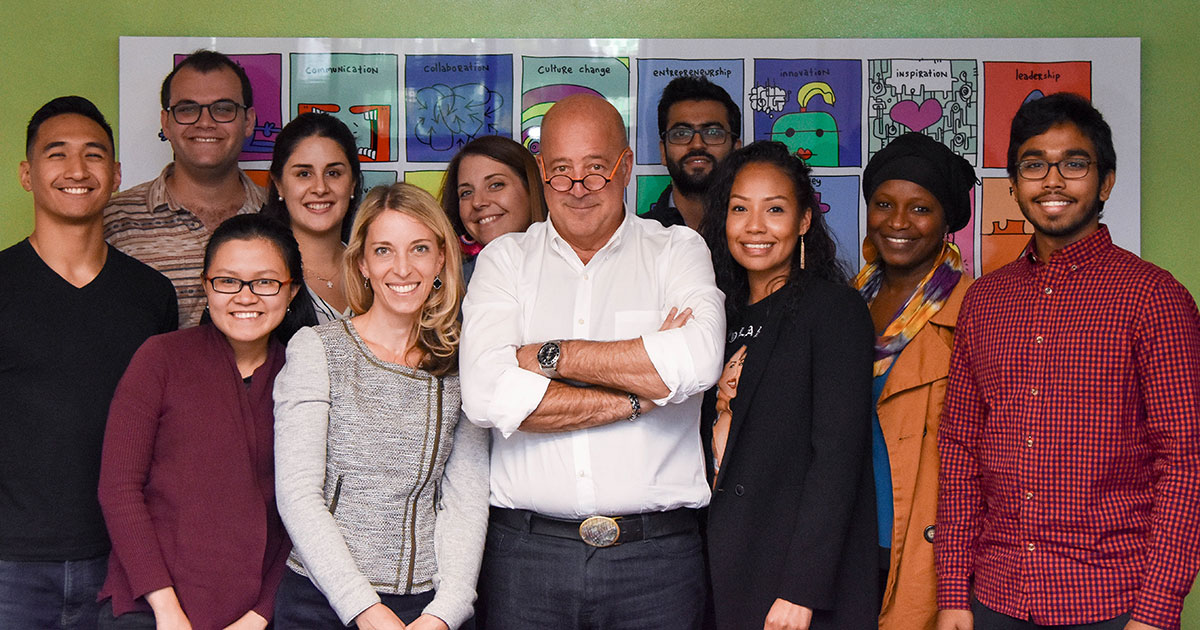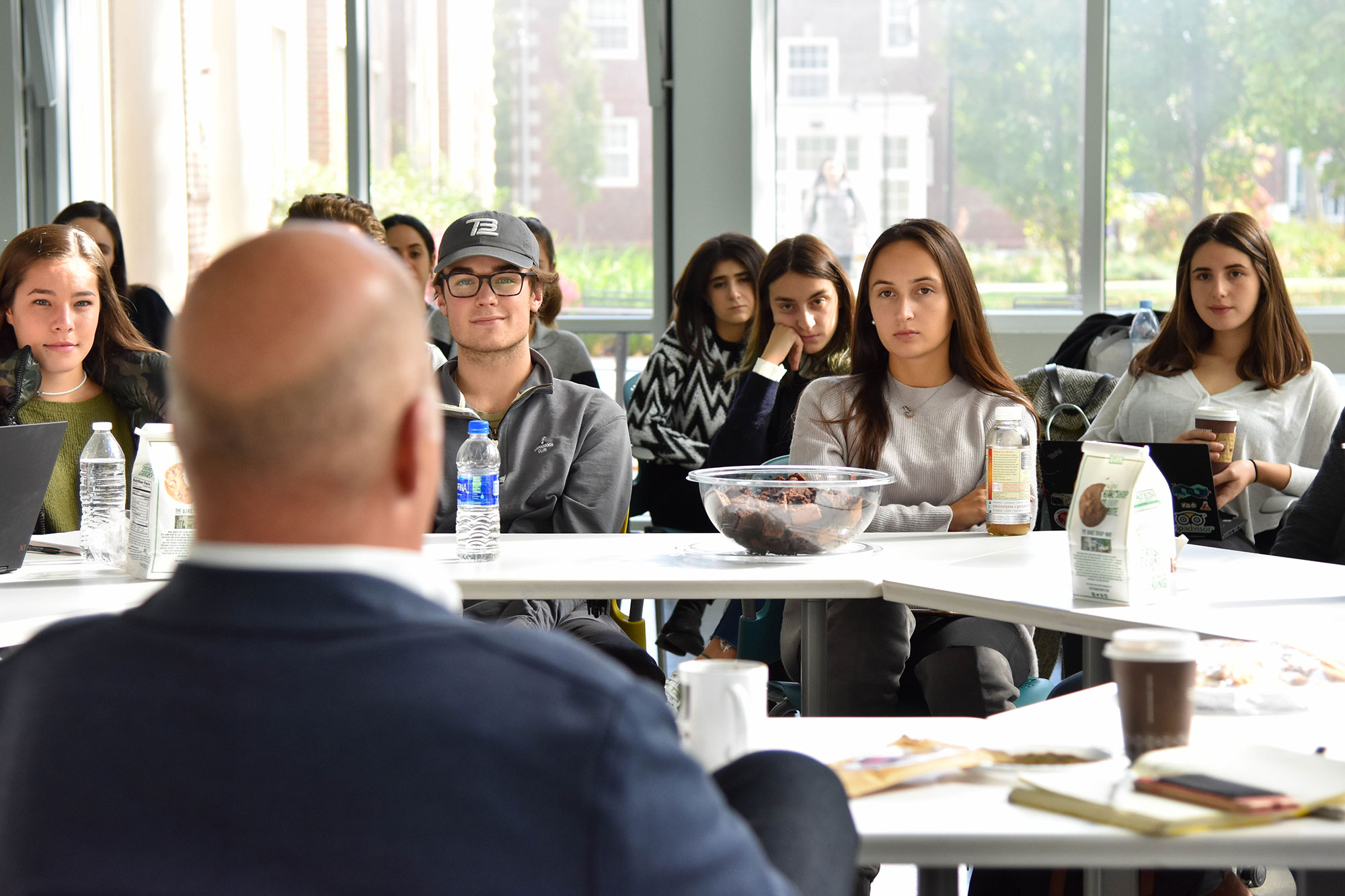Andrew Zimmern’s Advice for Young Entrepreneurs

When Andrew Zimmern walks into a room full of students, it’s hard to tell who’s more excited. But my bet’s on Andrew.
The “fat guy who goes around the world and eats bugs” (his words, not mine) pulls up a chair next to students, immediately diving into conversations.
Andrew has been a central part of the annual Babson Food Day for seven years. Before the day’s events open to the public, Andrew joins students for two Community Tables, or casual roundtable-style discussions. He first meets with a group of nine food entrepreneurs (mostly MBA students) for a family-style lunch and then meets with a much larger gathering of undergraduates. As each Table draws to a close, the Food Sol team has to pry Andrew away from students to get him to the next scheduled event relatively on time.
Food Day is not about how to make the best hamburger. The big TV personality (or “purposeful personality,” as his publicist, Rebecca Brooks, so eloquently says) is quick to share his funny yet poignant travel stories. He also isn’t shy about sharing the good and bad about his businesses (sometimes to Rebecca’s chagrin), his early battles with alcohol and drug addiction, his annoyance of words like “foodie” and titles like “Chef Andrew” (because, really, who goes around saying Farmer John or Lawyer Cheryl?), or his thoughts about the very complex problems involving food, social justice, mental health, and the planet.
Story after story, Babson students intently listen and ask questions. Michael Ioffe ’21 prompted Andrew to share his shaman story. Michael said, “I accidentally stumbled in here last year and caught three minutes of your story, and it honestly changed my life. I’d like to hear it again.”
Here are just a few of the insights Andrew shared with Babson students.
Have conversations with the coolest people you can find.
I always want to have a conversation with the coolest people that I can find. That’s why I love coming to Food Day. Students come up to me and say, “Thank you so much for being here.” But, it’s the other way around. Coming to Babson, I get so much more than I give. This is where I learn about stuff. This is where I get very excited. It’s a very selfish day for me. This is one of my handful of favorite days of the year. It’s right up there with my birthday, my kids’ birthdays, and the first day of Hanukkah, where I get to tell my non-Jewish friends in Minnesota made-up stories about the meaning of potato pancakes.
This is where I get my sensibility and energy, where ideas crystalize for me. I keep starting businesses endlessly, and there’s nothing better than hashing out somebody else’s issues to help me solve problems of my own. Every time I’m here, having these conversations, my business has changed for the better.
The question mark is where you should be.
You’re in a position of strength to not know it all.
If you have it all figured out, I would talk to someone about it and see if that’s really true. There may be one or two of you that had already figured out in high school what you’re passionate about doing. All you want to do is clean up plastic in the ocean, or rescue penguins. Then I say, go for it. Go. Do it.
But for most of us, the not knowing is knowing. (It’s very Kantian.)
Travel. Go to new places. Eat bugs and foods you’ve never had. There’s a transformational power of travel. We’re super-vulnerable. We’re better versions of ourselves. That’s how we learn. You don’t learn a lot from good things that happen. You don’t learn when you guess all the right answers. You learn things when you’re challenged, when you mess up. You have to completely blow the equation in order to really understand the math.
 Zimmern speaks with students during Babson Food Day in 2018.
Zimmern speaks with students during Babson Food Day in 2018.
Match calamity with inner serenity.
Especially for entrepreneurs, and especially in our volatile world today, you have to match calamity with an inner sense of serenity. Entrepreneurs tend to thrive on super-healthy stuff like kombucha and avocados, but we also have this really super-unhealthy competitive mojo. I always think of the Mel Brooks movie with the “Engulf and Devour” company.
Mental health, depression, and addiction are big issues in the food world, as we all know with stories like Tony’s. But, it’s not a food problem, it’s a human problem. We’re talking about real human beings and real lives.
We all go through these moments of Shakespearian tragedy or The Odyssey of Homer. Our boat is breaking apart, friends are being thrown overboard, and waves are coming. What do you do?
Life is fired at point-blank range. And, it’s always ambiguous. There is always going to be these Odyssean moments of turmoil, both in your business and personal life. You have to find a way to weather the uncertainty and to triage. Lean into what’s working. Find your spiritual pillar, a way of relating with the world. Maybe it’s yoga or over-exercising. Something that informs life, meaning, faith, and trust that everything is going to be OK.
People look at this giant fuzzball rat’s nest of stuff going on in my own life and wonder how I’m OK. And, I am OK. I’ve weathered a lot of stuff and I’m still standing. I know tomorrow, I will email Cheryl and Rachel and tell them what I learned at Babson today to maybe undo one thread of the fuzzball and slow down the carousel.
You gotta own your sh*t.
You have to take responsibility for your own stuff. The more you know what your weaknesses are, the more your partners and employees can protect you from yourself.
I have a huge ego and am brimming with confidence. It’s what got me where I am today, but I can have a little too much confidence, too. For example, I watched Legends of the Fall. You know that part where Anthony Hopkins steps out onto his porch wearing a bear coat, gazing out over half of Montana? I turned to my then-girlfriend and said, “I could ranch.” When Sam here today mentioned martial arts, my brain immediately said, “I could take him, right now.”
I’m a serial entrepreneur and shiny-object addict. I’m always starting new things. I have a superpower of making everything expensive and unwieldy. So, people who work with me know to involve me at the beginning and the end of a contract, but otherwise they know to keep this CEO out of the picture. Where we succeed or fail is how much I let them determine where we’re going, because they’re smart, trusted, and they know me.
So you have to be self-aware. You also have to put the right person in the right seat to run the business. I know that seems like a big “duh.” But, whether it’s your board or your team, you have to surround yourself with the right people. The people who helped you grow to one point may not be the people who can help you grow to the next.
Ask and listen.
Co-regulate. I hate that word. Co-regulate. Blech. But, it’s important. You have to learn how to co-regulate and communicate.
Asking for help is a sign of strength, not a sign of weakness. I had to teach myself to ask questions. I had to teach myself to listen. Otherwise, you end up talking at or over people. Hire an executive coach if you need to.
Everyone hears things differently. For example, say I want more raisins in my cookies.
For Melissa, I may only have to say, “Add two tablespoons of raisins to our cookies.” And, that’s all she needs. Done.
But, for Linh, I may have to say, “Hey, what do you think of putting dried fruit in our cookies?”
“Apricot?”
“No . . . something smaller.”
“Raisins?”
“Oh, my God! That’s it! Linh nailed it!”
Respect all people.
There’s a trend in television and elsewhere to dumb things down. I choose to treat my consumers with respect, with dignity, and like they’re smart.
Starting Bizarre Foods wasn’t about traveling the world eating bugs. It was really about patience, tolerance, and understanding. We often define ourselves by our differences instead of our commonalities, and I wanted to tackle that problem. That’s why I always included a family meal on my show. I want people around the world to see how alike we are.
In one of my earliest shows, I spent 10 days living with the Juntwazee, a small group of Kalahari Bushmen who are the oldest hunter-gatherer tribe in Botswana. They still live completely in sync with nature. It’s probably the best trip I’ve ever taken, the best show I’ve ever made (despite its production faults), and the most amazing people I’ve ever met.
After participating in an emotional trance ritual that went on for hours, I asked the shaman, “Why are we here on this earth? What’s your take?” In retrospect, what a naïve, ethnocentric, dumb question. And, his reaction was the greatest life lesson. He shook his head as if I was a moron. “We’re just on this earth to love each other.” And, he shook his head again.
That was 10 years ago, and there hasn’t been a day where I haven’t thought about it.
The biggest issue is an education issue.
Food is a powerful cultural totem. If people from another planet wanted to get the most accurate sense of who we are, they should look at our food. Food perfectly represents who we are at any given time in our culture: what we eat, how we eat it, who we eat it with, where we choose to spend our money on it. Sometimes it hurts.
We waste about 40 percent of our food in the U.S., while more than 12 percent of the country (800 million people) face hunger and food insecurity. I’ve said there are more than 10 ways to solve the food system, from plants in the ocean to drought-resistant grains. But, the No. 1 problem with our food system is that people don’t realize it’s our No. 1 problem. There’s an ostrich mentality.
That’s why I love being here. People here are a lot more aware of the issues. Issues are talked about here. It’s a place of learning, to talk about ideas. We have to.
I truly believe in the “we” of our globe. I went to see the 10 miles of plastic in the ocean, and it literally made me cry. It’s the most hideous, ugly thing that man ever created. And, it smells.
I’m not young. Sometimes it’s easy to think that I’m not going to have to worry about it in another 30 years. But, then I remember that profound thing that the chief of the Himba tribe in Namibia said to me, “We are going to listen to our children. It is their world.”
Featured photo: Andrew Zimmern with Food Sol’s Rachel Greenberger (left of Andrew) and a group of Babson’s rising food entrepreneurs.
Posted in Community



